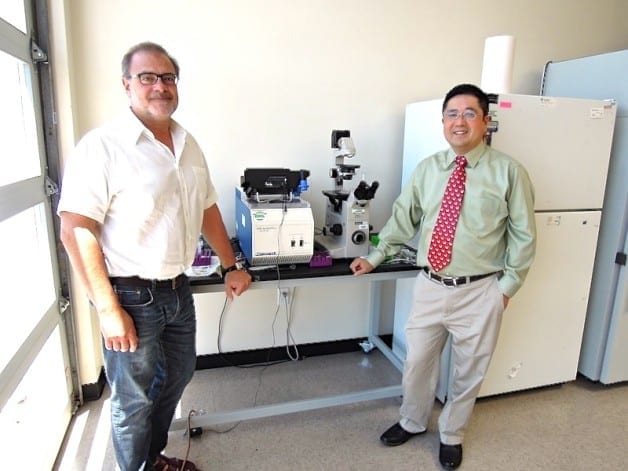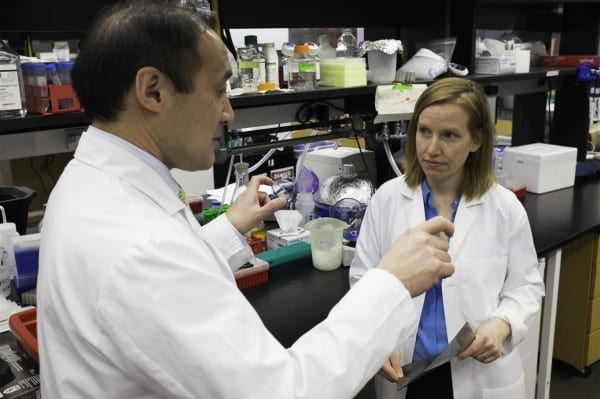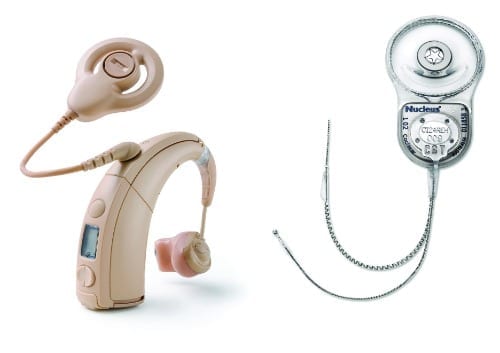
Imagine being able to test your food in your very own kitchen to quickly determine if it carried any deadly microbes.
Research conducted at Lawrence Berkeley National Laboratory (Berkeley Lab) and now being commercialized by Optokey may make that possible.
Optokey, a startup based in Hayward, California, has developed a miniaturized sensor based on Raman spectroscopy that can quickly and accurately detect or diagnose substances at a molecular level. “Our system can do chemistry, biology, biochemistry, molecular biology, clinical diagnosis, and chemical analysis,” said company president and co-founder Fanqing Frank Chen. “And our system can be implemented very cheaply, without much human intervention.”
The technology is based on surface-enhanced Raman spectroscopy, a technique for molecular fingerprinting. While SERS is a highly sensitive analytical tool, the results are not easily reproducible. As a scientist at Berkeley Lab, Chen and colleagues developed a solution to this problem using what they called “nanoplasmonic resonators,” which measures the interaction of photons with an activated surface using nanostructures in order to do chemical and biological sensing. The method produces measurements much more reliably.
“At Optokey we’re able to mass produce this nanoplasmonic resonator on a wafer scale,” Chen said. “We took something from the R&D realm and turned it into something industrial-strength.”
The miniaturized sensors use a microfluidic control system for “lab on a chip” automated liquid sampling. The company is taking a page from the semiconductor industry in making its chip. “We’re leveraging knowledge acquired from high-tech semiconductor manufacturing methods to get the cost, the volume, and the accuracy in the chip,” said VP of Manufacturing Robert Chebi, a veteran of the microelectronic industry who previously worked at Lam Research and Applied Materials. “We’re also leveraging all the knowledge in lasers and optics for this specific Raman-based method.”
Chebi calls Optokey’s product a “biochemical nose,” or an advanced nanophotonic automated system, with sensitivity to the level of a single molecule, far superior to sensors on the market today. “Today’s detection and diagnosis methods are far from perfect—detection limits are in PPM (parts per million) and PPB (parts per billion),” he said. “Also, our system can provide information in minutes, or even on a continuous basis, versus other methods where it could take hours or even days, if samples have to be sent to another lab.”
The potential applications, he says, are vast, including food safety, environmental monitoring (of both liquids and gases), medical diagnosis, and chemical analysis. Optokey’s customers include a major European company interested in food safety, a Chinese petrochemical company interested in detecting impurities in its products, and a German company interested in point-of-care diagnosis.
Read more: Berkeley Lab Spinoff Company Makes Fast, Accurate Nanoscale Sensor
The Latest on: Nanoscale Sensor
[google_news title=”” keyword=”Nanoscale Sensor” num_posts=”10″ blurb_length=”0″ show_thumb=”left”]
via Google News
The Latest on: Nanoscale Sensor
- Research Roundup: Sunscreen shields from sun and unsustainabilityon May 2, 2024 at 10:20 pm
Stanford researchers challenged the boundaries of sustainability, by protecting coral reefs and designing a sunscreen better for the skin and the planet.
- Resonators: Harnessing Vibrations at the Nanoscaleon April 30, 2024 at 12:05 pm
Nanoscale resonators can achieve extremely high Q factors ... This has applications in quantum sensing, where the resonator acts as a quantum-limited force or displacement sensor, and in quantum ...
- Imaging technique shows new details of peptide structureson April 24, 2024 at 11:19 am
A new imaging technique developed by engineers at Washington University in St. Louis can give scientists a much closer look at fibril assemblies—stacks of peptides that include amyloid beta, most ...
- Diamond-based quantum sensing microscope offers effective approach for quantifying cellular forceson April 22, 2024 at 5:56 am
Cells rely on constant interplay and information exchange with their micro-environment to ensure their survival and perform biological functions. Hence, precise quantification of tiny cellular ...
- Scientists discover super sensor for the smallest scaleson March 19, 2024 at 6:56 am
The probe has been used for imaging at the nanoscale level—about nine orders ... the amount of material will be too small even for this sensor," Passian said. "Then the next step will be quantum ...
- Nanopatterning: Crafting Nanostructures with Precisionon March 14, 2024 at 3:50 am
Nanopatterning plays a crucial role in the development of biosensors and biomedical devices. By creating nanoscale patterns on sensor surfaces, researchers can enhance the sensitivity, selectivity, ...
- Nanoscale Horizonson October 18, 2023 at 10:37 pm
Nanoscale Horizons Communications must include a separate ... We report a new tactile electronic skin sensor based on staircase-like vertically aligned gold nanowires (V-AuNWs). With the back-to-back ...
- Hacker-Friendly And Elegant Air Quality Sensor Hubon February 26, 2023 at 6:54 pm
Ever wanted an indoor environment sensor that’s dead simple yet a complete package? That’s the anotter-sensor-hub project from [Jana Marie], designed for the Sensirion SEN05x series sensors ...
- A Nanoscale Voltmeter Reveals Biology Hidden in Plain Sighton April 13, 2021 at 9:18 am
Voltair (right), a sensor developed to measure the membrane potential of organelles, operates on a similar principle but uses fluorescent molecules as probes. Credit: Yamuna Krishnan At the ...
- Nanoscale Advances editorial board memberson May 29, 2018 at 9:16 pm
Her work of quantum sensing focus on sensor development and application in condense matter ... at Vanderbilt University and a member of the Vanderbilt Institute for Nanoscale Science and Engineering.
via Bing News










